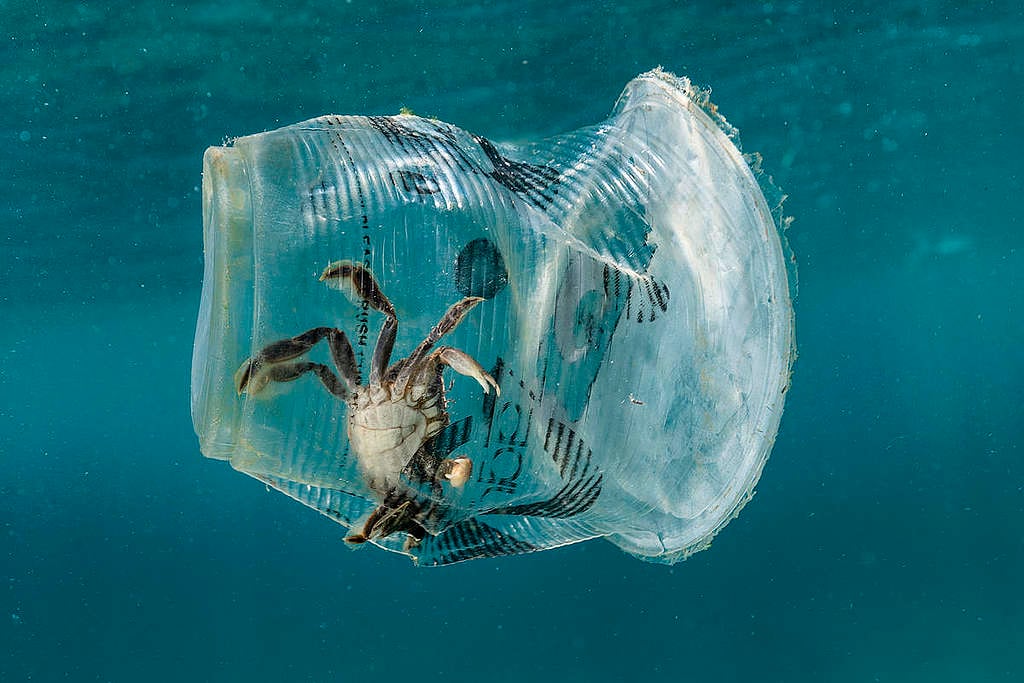<04 June 2018, Manila, Philippines – On World Environment Day, Greenpeace Philippines called for ‘action from all fronts’, especially from companies most responsible for producing single-use plastic, in order to beat ‘catastrophic pollution’ that chokes the planet. Unilever, Nestlé, Procter & Gamble, Colgate-Palmolive, and PT Torabika Eka Semesta were among the multinational companies that are the biggest sources of plastic wastes, as revealed in a waste assessment and brand audit, conducted in six Philippine cities by the Global Alliance for Incinerator Alternatives (GAIA) and Mother Earth Foundation (MEF) [1]. This is consistent with the released result in September 2017 that also identified these companies as top-polluters in a brand audit conducted by the Break Free from Plastic movement, including Greenpeace, in Freedom Island in Metro Manila [2]. “These companies must get their acts together and start the reduction of single-use plastic packaging in their products. Rather than just relying on individuals who are sincerely changing their habits in using plastics, these companies, who are making a lot of money from consumers, should invest in long-term solutions that will curb plastic pollution in our cities and waterways,” said Angelica Carballo Pago, campaigner for Greenpeace Philippines. Greenpeace urged companies to do away with single-use packaging and instead introduce ecologically-sound, long-term innovations that will help alleviate the mounting plastic pollution problem, which primarily affects the poor and marginalized sectors of society. Plastic pollution is a multifaceted challenge that encompasses many environmental ills – from polluting our oceans, to promotion of unhealthy diets, to fuelling climate change. All over the world, 300 million tons of plastic are produced annually, while approximately 8 million tons of plastic waste enter the sea each year[3]. In addition, plastic production reinforces an even bigger problem that’s already affecting the lives of millions of people around the world: climate change. A report by the Center for International Environmental Law (CIEL), released in September 2017 and entitled “Fueling Plastics”, details how over 99% of plastics are produced from chemicals sourced from fossil fuels [4]. As plastic and fossil fuels industries are deeply intertwined, it could be said with certainty that plastic production is contributing to greenhouse gas (GHG) emissions fueling climate change. Greenpeace Climate & Energy Campaigner Khevin Yu says that consumers can help the reduction not just of plastic pollution, but carbon emissions as well, through their everyday choices. “By refusing plastic, which is a byproduct of fossil fuels, consumers are breaking free not just from plastics, but also from dirty energy. This is a simple yet valuable act that can help end the fossil fuel industry’s grip on our economy, our politics, and our lives,” said Yu. The new data from GAIA and MEF also revealed that 79% of the branded plastic residual wastes collected comes from food packaging. Virginia Benosa Llorin, Food and Ecological Agriculture campaigner of Greenpeace Philippines, said that the promotion of supposedly cheap but unhealthy food, tainted with toxic chemicals and preservatives, and wrapped in single-use plastic packaging, is costing Filipino citizens more, especially low income families. “It is communities in marginalized sectors who have to deal with these interconnected problems — not just dealing with the single-use plastic trash from our cities and towns, but also the cost to their health, from both the plastic pollution and the unhealthy food that these big corporations peddle,” Benosa Llorin said. “The global food system is currently responsible for a quarter of all GHG emissions that is causing climate change. Livestock alone accounts for 14%, comparable to the whole transport sector. We need ecologically-produced, plant-based food choices over industrial and processed meat. We need to reimagine our consumption, including our food, from their sources down to how they reach our plates,” Benosa Llorin added. Greenpeace is part of the global #breakfreefromplastic movement that envisions a future free from plastic pollution. Notes to the editor:
[1] Philippines waste assessment and brand audit results
[2] Nestle, Unilever, P&G among worst offenders for plastic pollution in Philippines in beach audit
[3] Plastic waste inputs from land to ocean
[4] Fueling Plastics
For more information, contact:
JP Agcaoili, Communications Manager, Greenpeace Southeast Asia – Philippines
[email protected] | +63 949 889 1334
Angelica Carballo Pago, Campaigner, Greenpeace Southeast Asia – Philippines
[email protected] | +63 949 889 1332

